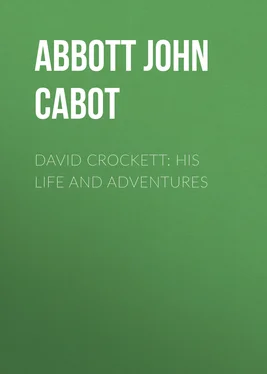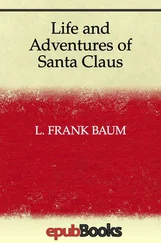John Abbott - David Crockett - His Life and Adventures
Здесь есть возможность читать онлайн «John Abbott - David Crockett - His Life and Adventures» — ознакомительный отрывок электронной книги совершенно бесплатно, а после прочтения отрывка купить полную версию. В некоторых случаях можно слушать аудио, скачать через торрент в формате fb2 и присутствует краткое содержание. Жанр: foreign_prose, История, foreign_edu, foreign_antique, на английском языке. Описание произведения, (предисловие) а так же отзывы посетителей доступны на портале библиотеки ЛибКат.
- Название:David Crockett: His Life and Adventures
- Автор:
- Жанр:
- Год:неизвестен
- ISBN:нет данных
- Рейтинг книги:4 / 5. Голосов: 1
-
Избранное:Добавить в избранное
- Отзывы:
-
Ваша оценка:
- 80
- 1
- 2
- 3
- 4
- 5
David Crockett: His Life and Adventures: краткое содержание, описание и аннотация
Предлагаем к чтению аннотацию, описание, краткое содержание или предисловие (зависит от того, что написал сам автор книги «David Crockett: His Life and Adventures»). Если вы не нашли необходимую информацию о книге — напишите в комментариях, мы постараемся отыскать её.
David Crockett: His Life and Adventures — читать онлайн ознакомительный отрывок
Ниже представлен текст книги, разбитый по страницам. Система сохранения места последней прочитанной страницы, позволяет с удобством читать онлайн бесплатно книгу «David Crockett: His Life and Adventures», без необходимости каждый раз заново искать на чём Вы остановились. Поставьте закладку, и сможете в любой момент перейти на страницу, на которой закончили чтение.
Интервал:
Закладка:
"But all these reflections did not satisfy my mind, for I had no peace, day nor night, for several weeks. My appetite failed me, and I grew daily worse and worse. They all thought I was sick; and so I was. And it was the worst kind of sickness, a sickness of the heart, and all the tender parts, produced by disappointed love."
For some time David continued in a state of great dejection, a lovelorn swain of seventeen years. Thus disconsolate, he loved to roam the forest alone, with his rifle as his only companion, brooding over his sorrows. The gloom of the forest was congenial to him, and the excitement of pursuing the game afforded some slight relief to his agitated spirit. One day, when he had wandered far from home, he came upon the cabin of a Dutchman with whom he had formed some previous acquaintance. He had a daughter, who was exceedingly plain in her personal appearance, but who had a very active mind, and was a bright, talkative girl.
She had heard of David's misadventure, and rather unfeelingly rallied him upon his loss. She however endeavored to comfort him by the assurance that there were as good fish in the sea as had ever been caught out of it. David did not believe in this doctrine at all, as applied to his own case, He thought his loss utterly irretrievable. And in his still high appreciation of himself, notwithstanding his deep mortification, he thought that the lively Dutch girl was endeavoring to catch him for her lover. In this, however, he soon found himself mistaken.
She told him that there was to be a reaping frolic in their neighborhood in a few days, and that if he would attend it, she would show him one of the prettiest girls upon whom he ever fixed his eyes. Difficult as he found it to shut out from his mind his lost love, upon whom his thoughts were dwelling by day and by night, he very wisely decided that his best remedy would be found in what Dr. Chalmers calls "the expulsive power of a new affection;" that is, that he would try and fall in love with some other girl as soon as possible. His own language, in describing his feelings at that time, is certainly very different from that which the philosopher or the modern novelist would have used, but it is quite characteristic of the man. The Dutch maiden assured him that the girl who had deceived him was not to be compared in beauty with the one she would show to him. He writes:
"I didn't believe a word of all this, for I had thought that such a piece of flesh and blood as she had never been manufactured, and never would again. I agreed with her that the little varmint had treated me so bad that I ought to forget her, and yet I couldn't do it. I concluded that the best way to accomplish it was to cut out again, and see if I could find any other that would answer me; and so I told the Dutch girl that I would be at the reaping, and would bring as many as I could with me."
David seems at this time to have abandoned all constant industry, and to be loafing about with his rifle, thus supporting himself with the game he took. He traversed the still but slightly broken forest in all directions, carrying to many scattered farm-houses intelligence of the approaching reaping frolic. He informed the good Quaker with whom he had worked of his intention to be there. Mr. Kennedy endeavored to dissuade him. He said that there would be much bad company there; that there would be drinking and carousing, and that David had been so good a boy that he should be very sorry to have him get a bad name.
The curiosity of the impetuous young man was, however, by this time, too much aroused for any persuasions to hold him back. Shouldering his rifle, he hastened to the reaping at the appointed day. Upon his arrival at the place he found a large company already assembled. He looked around for the pretty girl, but she was nowhere to be seen. She chanced to be in a shed frolicking with some others of the young people.
But as David, with his rifle on his shoulder, sauntered around, an aged Irish woman, full of nerve and volubility, caught sight of him. She was the mother of the girl, and had been told of the object of David's visit. He must have appeared very boyish, for he had not yet entered his eighteenth year, and though very wiry and athletic, he was of slender frame, and rather small in stature.
The Irish woman hastened to David; lavished upon him compliments respecting his rosy cheeks, and assured him that she had exactly such a sweet heart for him as he needed. She did not allow, David to have any doubt that she would gladly welcome him as the husband of her daughter.
Pretty soon the young, fresh, blooming, mirthful girl came along; and David fell in love with her at first sight. Not much formality of introduction was necessary: each was looking for the other. Both of the previous loves of the young man were forgotten in an instant. He devoted himself with the utmost assiduity, to the little Irish girl. He was soon dancing with her. After a very vigorous "double shuffle," as they were seated side by side on a bench intensely talking, for David Crockett was never at a loss for words, the mother came up, and, in her wonderfully frank mode of match-making, jocosely addressed him as her son-in-law.
Even David's imperturbable self-possession was disturbed by this assailment. Still he was much pleased to find both mother and daughter so favorably disposed toward him. The rustic frolicking continued nearly all night. In the morning, David, in a very happy frame of mind, returned to the Quaker's, and in anticipation of soon setting up farming for himself, engaged to work for him for six months for a low-priced horse.
CHAPTER III
Marriage and Settlement
Rustic Courtship.—The Rival Lover.—Romantic Incident.—The Purchase of a Horse.—The Wedding.—Singular Ceremonies.—The Termagant.—Bridal Days.—They commence Housekeeping.—The Bridal Mansion and Outfit.—Family Possessions.—The Removal to Central Tennessee.—Mode of Transportation.—The New Home and its Surroundings.—Busy Idleness.—The Third Move.—The Massacre at Fort Mimms.
David took possession of his horse, and began to work very diligently to pay for it. He felt that now he was a man of property. After the lapse of a few weeks he mounted his horse and rode over to the Irishman's cabin to see his girl, and to find out how she lived, and what sort of people composed the family. Arriving at the log hut, he found the father to be a silent, staid old man, and the mother as voluble and nervous a little woman as ever lived. Much to his disappointment, the girl was away. After an hour or two she returned, having been absent at some meeting or merry-making, and, much to his chagrin, she brought back with her a stout young fellow who was evidently her lover.
The new-comer was not at all disposed to relinquish his claims in favor of David Crockett. He stuck close to the maiden, and kept up such an incessant chatter that David could scarcely edge in a word. In characteristic figure of speech he says, "I began to think I was barking up the wrong tree again. But I determined to stand up to my rack, fodder or no fodder." He thought he was sure of the favor of her parents, and he was not certain that the girl herself had not given him sundry glances indicative of her preference. Dark night was now coming on, and David had a rough road of fifteen miles to traverse through the forest before he could reach home. He thought that if the Irishman's daughter cherished any tender feelings toward him, she would be reluctant to have him set out at that late hour on such a journey. He therefore rose to take leave.
His stratagem proved successful. The girl immediately came, leaving her other companion, and in earnest tones entreated him not to go that evening. The lover was easily persuaded. His heart grew lighter and his spirit bolder. She soon made it so manifest in what direction her choice lay, that David was left entire master of the field. His discomfited rival soon took his hat and withdrew, David thus was freed from all his embarrassments.
Читать дальшеИнтервал:
Закладка:
Похожие книги на «David Crockett: His Life and Adventures»
Представляем Вашему вниманию похожие книги на «David Crockett: His Life and Adventures» списком для выбора. Мы отобрали схожую по названию и смыслу литературу в надежде предоставить читателям больше вариантов отыскать новые, интересные, ещё непрочитанные произведения.
Обсуждение, отзывы о книге «David Crockett: His Life and Adventures» и просто собственные мнения читателей. Оставьте ваши комментарии, напишите, что Вы думаете о произведении, его смысле или главных героях. Укажите что конкретно понравилось, а что нет, и почему Вы так считаете.





![William Frith - John Leech, His Life and Work. Vol. 1 [of 2]](/books/747171/william-frith-john-leech-his-life-and-work-vol-thumb.webp)

![William Frith - John Leech, His Life and Work, Vol. 2 [of 2]](/books/748201/william-frith-john-leech-his-life-and-work-vol-thumb.webp)


